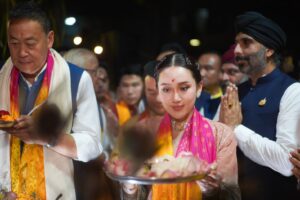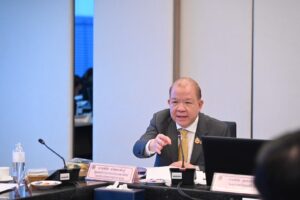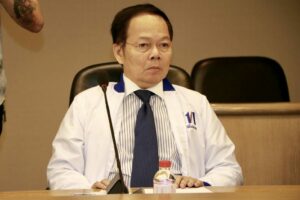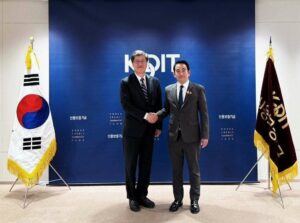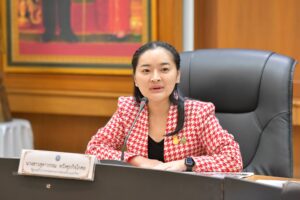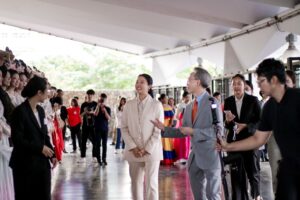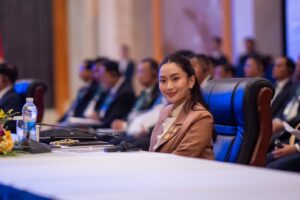PHEU THAI PARTY STATEMENT REQUEST TO RECONSIDER THE PROCEDURES TO SUE FOR COMPENSATION FOR LOSSES IN THE RICE-PLEDGING SCHEME AND TO REVOKE THE USE OF SECTION 44 AS IT IS NOT IN THE SPIRIT OF THE CONSTITUTION
The
Chief of the National Council for Peace and Order (NCPO) took action to call
for compensation from the former Prime Minister, the Ministers and those
involved in the rice-pledging scheme and invoked Section 44 of the interim
constitution to issue the order No. 56/2559 on September 13, 2016 authorizing
the Legal Execution Department to force the Administration to seize, confiscate
and auction the properties of those charged for their roles in the
rice-pledging scheme. At the same time,
the NCPO Chief also issued the order No. 39/2558 that grants protection to
officials involved in handling the case.
Pheu
Thai Party sees that the government and the NCPO Chief has clear intention to
implicate the former Prime Minister and those involved to bear responsibility
for losses from the rice-pledging scheme without following legal
procedures. This was made clear from the
interviews given by the Prime Minister and NCPO Chief and the Deputy Prime
Minister, leading the public and the officials involved to believe that the
accused had committed crimes and would have to pay compensations as soon as
possible. The special power issued under
Section 44 of the interim constitution was invoked in lieu of the regular laws
specifically for this case. Pheu Thai
Party deems that such action is an abuse of authority, discriminates and
creates unfairness to the accused due to the following reasons:
1. The
rice-pledging scheme case has been filed to the Supreme Court’s Criminal
Division for Holders of Political Positions and is awaiting court ruling. If the court rules that the defendants are in
the wrong, then civil liability lawsuit proceedings may be filed against
them. It is inappropriate for leaders to
lead the society into making conclusions before the court has announced its
ruling.
2. The
rice-pledging scheme was the government’s policy to provide agricultural
subsidies to support the famers who form a large and vulnerable sector of the
Thai populace. The aim was to assist the
farmers as a whole. This is the first
case of its kind where the government is being sued for compensations and where
profit and loss is cited as the reason for the lawsuit. The former head of
government is also being sued as the prime defendant even though there have
been several projects of similar nature taken by all past governments and by
governments of other countries.
3. Filing
for losses from the rice-pledging scheme is a matter that relates to the government
policy; it is not an act of violation
such as the causing of destruction to government property or embezzlement of
government funds for which the violations and exact amounts can be determined. Moreover, seizure, confiscation and auction
of individual properties are to be considered infringements of individual
rights. The process to ascertain the
amount of compensations against the accused should not be done in a rush but
should await the criminal court’s ruling which will give clear indication on
those who will be formally charged and those who will not.
4. By
claiming that the case needs to be expedited as the statute of limitation may
expire is a false claim. It is still
unclear whether the accused are in the wrong and as such, it cannot yet be
determined as who the wrong-doers are so the legal process should not begin
till then. By citing this as a pretext
to expedite the compensation process, to be done within the tenure of this
government, is a prejudiced view with a political intention by those that came to
power through the coup d’état.
5. By
issuing the order No. 39/2558 or No. 56/2559, the NCPO Chief had granted
protection to officials involved in filing the civil liability lawsuits for the
compensations and had empowered the Legal Execution Department to force the
Administration to take action in lieu of the Permanent Secretary of the
Ministry of Finance, as stipulated by law. This will allow the officials
involved to take actions without regard to the rule of law as they will be
protected and the actions they take will only be to achieve the aims of those
in power. Therefore these actions may be
discriminatory and unfair and go against the equality principle as stated in
the Constitution, the United Nation’s
Universal Declaration of Human Rights and the International Covenant on Civil
and Political Rights for which Thailand has legal obligations to abide by the
rules.
6. Section 44 of the interim constitution was
not written on the principles of democracy and rule of law. It was written by the NCPO Chief for his own
means so the powers granted by this Section did not come from the people’s
consent. Invoking the use of this power
should then be within the principles and conditions set in the Constitution. The orders that were issued by the NCPO chief,
as stated above, do not come under the conditions that may invoke the use of
Section 44, as granting protection to the officials handling the case and
empowering the Department of Legal Execution to seize and confiscate personal
properties do not fall within the conditions stipulated in the Constitution,
nor to the pretext used for issuing those orders. Moreover, the persons who issued these orders
must also consider if this is done with righteousness.
It
is clear that the NCPO and the present government are not in favor of the rice-pledging scheme. As such, they are considered to be “a stakeholder”, “a conflicting partner” and
not “an impartial party” in
this situation. By trying to sue the former Prime Minister Yingluck and those involved in the
scheme through the “directives of the Administration” rather than
through the civil lawsuit process is unfair and goes against the rule of
law. This may lead to the understanding
that there are attempts and/or intentions to use various means to destroy
political parties and political leaders that have different opinions, which
amounts to having intentions to destroy the democratic system of the Thai
society.
Pheu Thai Party calls on the Chief of
the NCPO and the government to follow all normal legal procedures and not to invoke
the use of the special powers under Section 44 of the interim constitution to
force to expedite the process in order to implicate certain persons. Also, state officials should carry out their
duties with fairness and with regard to the rule of law so there should be no
exception or protection for their actions.
Therefore, we request that the procedures to sue for compensation for
the rice-pledging scheme is to be given a reconsideration and that the use of
Section 44 is to be revoked as it is not within the spirit of the Constitution.
This statement is for
information.
Pheu Thai Party
September 25, 2016

